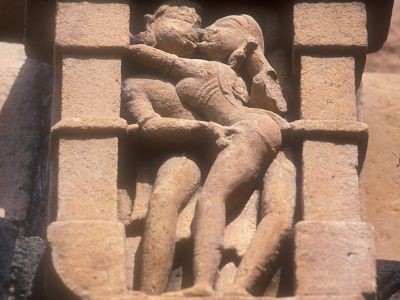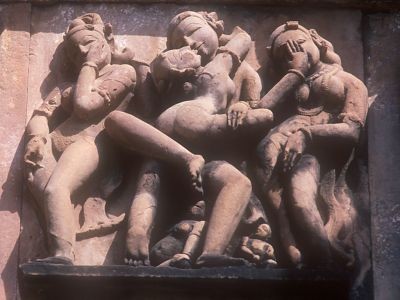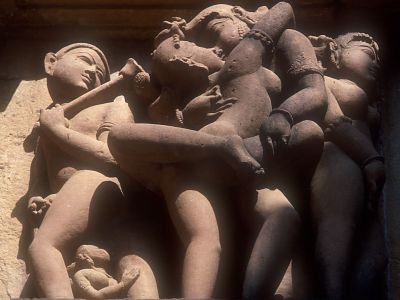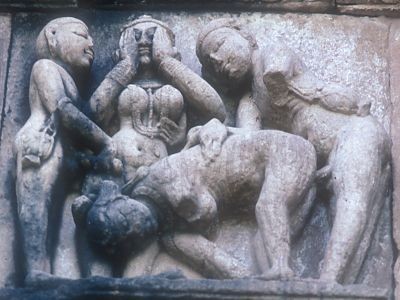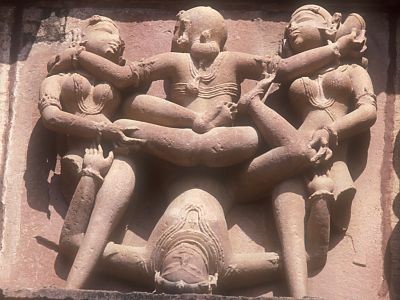Chanakya has given in great detail the rules for re-marriage and property of widows and abandoned wives.
He has also ruled that the state should look after helpless women with no one to look after them.
There is absolutely no mention of sati sahamaranam at his time.
Types of Marriage :
- MARRIAGE precedes the other calls of life (vyavahára.)
- The giving in marriage of a maiden well-adorned is called Bráhma-marriage. The joint-performance of sacred duties (by a man and a woman) is known as prájápatya marriage.
- (The giving in marriage of a maiden) for a couple of cows is called Arsha.
- (The giving in marriage of a maiden) to an officiating priest in a sacrifice is called Daiva.
- The voluntary union of a maiden with her lover is called Gándharva.
- Giving a maiden after receiving plenty of wealth (súlka) is termed Asura.
- The abduction of a maiden is called Rákshasa.
- The abduction of a maiden while she is asleep and in intoxication is called Paisácha marraige.
- Of these, the first four are ancestral customs of old and are valid on their being approved of by the father.
- The rest are to be sanctioned by both the father and the mother; for it is they that receive the money (súlka) paid by the bridegroom for their daughter.
- In case of the absence by death of either the father or the mother, the survivor will receive the súlka. If both of them are dead, the maiden herself shall receive it. Any kind of marriage is approvable, provided it pleases all those (that are concerned in it.)
Property of Women :
- Means of subsistence (vritti) or jewellery (ábadhya) constitutes what is called the property of a woman. Means of subsistence valued at above two thousand shall be endowed (on her name).
- There is no limit to jewellery.
- It is no guilt for the wife to make use of this property in maintaining her son, her daughter-in-law or herself whenever her absent husband has made no provision for her maintenance.
- In calamities, disease and famine, in warding off dangers and in charitable acts, the husband, too, may make use of this property.
- Neither shall there be any complaint against the enjoyment of this property by mutual consent by a couple who have brought forth a twin.
- Nor shall there be any complaint if this property has been enjoyed for three years by those who are wedded in accordance with the customs of the first four kinds of marriage.
- But the enjoyment of this property in the cases of Gándharva and Asura marriages shall be liable to be restored together with interest on it.
- In the case of such marriages as are called Rákshasa and Paisacha, the use of this property shall be dealt with as theft.
Widow Re-marriage and property :
- On the death of her husband a woman, desirous to lead a pious life, shall at once receive not only her endowment and jewellery (sthápyábharanam), but also the balance of súlka due to her.
- If both of these two things are not actually in her possession, though nominally given to her, she shall at once receive both of them together with interest (on their value.)
- If she is desirous of a second marriage (kutumbakáma), she shall be given on the occasion of her remarriage (nivesakále) whatever either her father-in-law or her husband or both had given to her.
- If a widow marries any man other than of her father-in-law’s selection (svasuraprátilo- myenanivishtá), she shall forfeit whatever had been given to her by her father-in-law and her husband.
- The kinsmen (gnátis) of a woman shall return to her whatever property of her own she had placed in their custody.
- Whoever justly takes a woman under his protection shall equally protect her property.
- No woman shall succeed in her attempt to establish her title to the property of her husband.
- If she lives a pious life, she may enjoy it (dharmakámá bhunjíta).
- A barren widow who is faithful to the bed of her dead husband may, under the protection of her teacher, enjoy her property as long as she lives: for it is to ward off calamities that women are endowed with property.
- On her death, her property shall pass into the hands of her kinsmen (dáyáda).
Widowed Mother Property :
- No woman with a son or sons shall be at liberty to make free use of her own property (strídhana); for that property of hers her sons shall receive.
- If a woman attempts to take possession of her own property under the plea of maintaining her sons, she shall be made to endow it in their name.
- If a woman has many male children, then she shall conserve her own property in the same condition as she had received from her husband. Even that property which has been given her with full powers of enjoyment and disposal she shall endow in the name of her sons.
Widower Property :
- If the husband is alive and the wife is dead, then her sons and daughters shall divide her property among themselves.
- If there are no sons, her daughters shall have it.
- In their absence her husband shall take that amount of money (súlka) which he had given her, and her relatives shall retake whatever in the shape of gift or dowry they had presented her. Thus the determination of the property of a woman is dealt with.
Second Marriage of Males.
- If a woman either brings forth no (live) children, or has no male issue, or is barren, her husband shall wait for eight years, (before marrying another).
- If she bears only a dead child, he has to wait for ten years.
- If she brings forth only females, he has to wait for twelve years.
- Then if he is desirous to have sons, he may marry another.
- In case of violating this rule, he shall be made to pay her not only sulka, her property (strídhana) and an adequate monetary compensation (ádhivedanikamartham), but also a fine of 24 panas to the Government.
- Having given the necessary amount of sulka and property (strídhana) even to those women who have not received such things on the occasion of their marriage with him, and also having given his wives the proportionate compensation and an adequate subsistence (vritti), he may marry any number of women.
- If a husband either is of bad character or is long gone abroad or has become a traitor to his king or is likely to endanger the life of his wife or has fallen from his caste or has lost virility, he may be abandoned by his wife.
Divorce by Mutual Consent :
A woman, hating her husband, can not dissolve her marriage with him against his will. Nor can a man dissolve his marriage with his wife against her will. But from mutual enmity, divorce may be obtained (parasparam dveshánmokshah). If a man, apprehending danger from his wife desires divorce (mokshamichhet), he shall return to her whatever she was given (on the occasion of her marriage). If a woman, under the apprehension of danger from her husband, desires divorce, she shall forfeit her claim to her property;
* Marriages contracted in accordance with the customs of the first four kinds of marriages cannot be dissolved.
Re-marriage of women whose husbands have gone away.
- Wives who belong to Súdra, Vaisya, Kshatriya or Bráhman caste, and who have not given birth to children should wait as long as a year for their husbands who have gone abroad for a short time; but if they are such as have given birth to children, they should wait for their absent husbands for more than a year.
- If they are provided with maintenance, they should wait for twice the period of time just mentioned.
- If they are not so provided with, their well-to-do gnátis should maintain them either for four or eight years.
- Then the gnátis should leave them to marry after taking what had been presented to them on the occasion of their marriages.
- If the husband is a Bráhman, studying abroad, his wife who has no issue should wait for him for ten years but if she has given birth to children, she should wait for twelve years.
- If the husband is of Kshatriya caste, his wife should wait for him till her death; but even if she bears children to a savarna husband, (i.e., a second husband belonging to the same gotra as that of the former husband) with a view to avoid the extinction of her race, she shall not be liable to contempt thereof (savarnatascha prajátá ná pavádam labheta).
- If the wife of an absent husband lacks maintenance and is deserted by well-to-do gnátis, she may remarry one whom she likes and who is in a position to maintain her and relieve her misery.
- A young wife (kumárí) who is wedded in accordance with the customs of the first four kinds of marriage (dharmaviváhát), and whose husband has gone abroad and is heard of shall wait for him for the period of seven menses (saptatirthányákánksheta), provided she has not publicly announced his name;
- But she shall wait for him a year in case of her having announced the name of her absent husband who is heard of.
- In the case of a husband who is gone abroad but who is not heard of, his wife shall wait for the period of five menses,
- If the absent husband is not heard of, his wife shall wait for him for the period of ten menses.
- In the case of a husband who is gone abroad and is not heard of, his wife shall, if she has received only a part of sulka from him, wait for him for the period of three menses
- But if he is heard of, she shall wait for him for the period of seven menses.
- A young wife who has received the whole amount of sulka shall wait for the period of five menses for her absent husband who is not heard of;
- But if he is heard of, she shall wait for him for the period of ten menses.
- Then with the permission of judges (dharma-sthairvisrishtá), she may marry one whom she likes.
- In the case of husbands who have long gone abroad (dirgrhapravásinah), who have become ascetics, or who have been dead, their wives, having no issue, shall wait for them for the period of seven menses;
- But if they have given birth to children, they shall wait for a year.
- Then (each of these women) may marry the brother of her husband. If there are a number of brothers to her lost husband, she shall marry such a one of them as is next in age to her former husband, or as is virtuous and is capable of protecting her, or one who is the youngest and unmarried.
- If there are no brothers to her lost husband, she may marry one who belongs to the same gotra as her husband’s or relative.
- But if there are many such persons as can be selected in marriage, she shall choose one who is a nearer relation of her lost husband.



